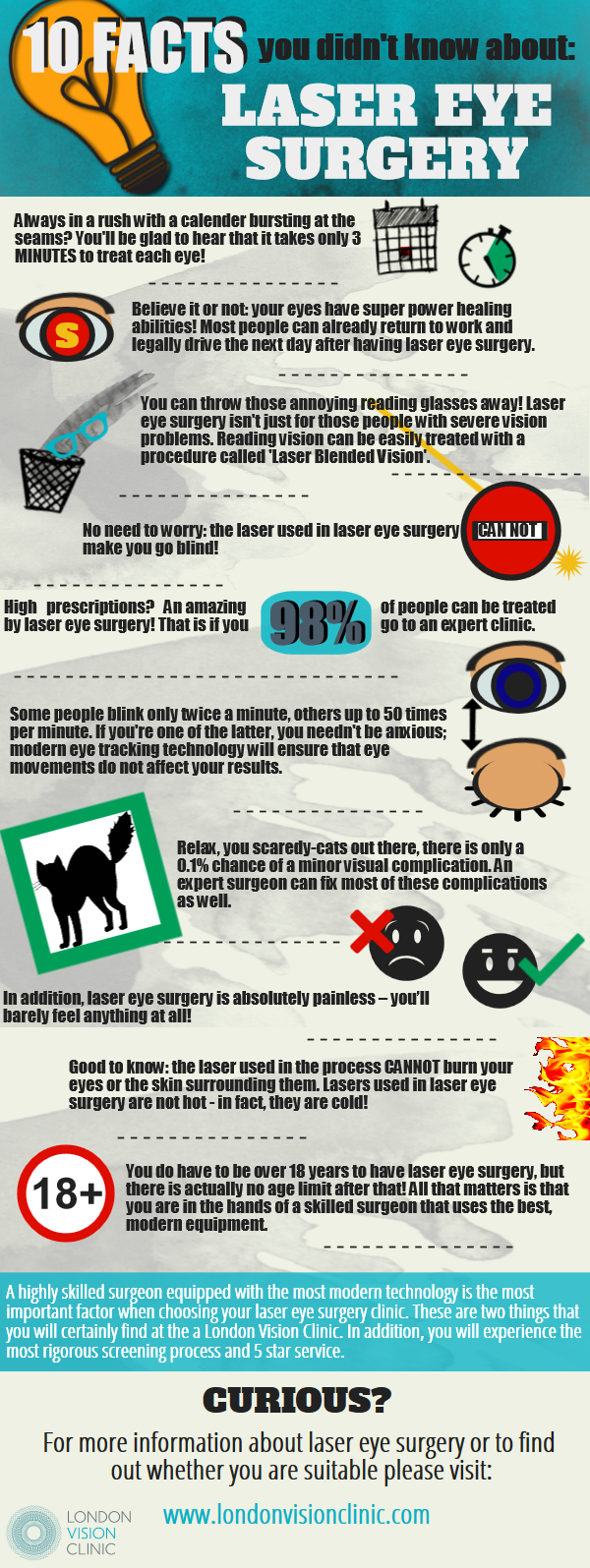Frequently Asked Questions Concerning Lasik Eye Surgical Procedure

Created by- https://blogfreely.net/rendaedward/understanding-the-various-kinds-of-refractive-surgical-procedure-procedures to LASIK, your eye specialist will evaluate your vision to make sure it is stable. She or he will likewise inspect to see if you have any other eye issues that might impact your outcomes.
After the ophthalmologist has applied numbing eye decreases, he or she will certainly create a paper-thin flap in your cornea cells using a tool called a microkeratome or laser. The procedure is painless.
What Is LASIK?
LASIK is a type of refractive surgical procedure. It deals with vision issues triggered by refractive errors, which happen when the cornea or lens don't properly flex light rays.
Lots of people that have LASIK attain great range vision without glasses or get in touches with. However, they might need reading glasses to see close up. The outcomes of LASIK are permanent, although aesthetic negative effects are momentary.
Can I Have LASIK if I Have Astigmatism?
Blurred vision is frequently triggered by astigmatism. LASIK can help with this trouble by making your cornea a lot more balanced. The cosmetic surgeon will utilize a device called a microkeratome or laser to reduce a thin flap in your cornea, then fold it back. They will certainly then utilize a laser to improve the cornea so it can flex light much better.
The only thing that LASIK can not do is correct presbyopia (age-related farsightedness). This can only be performed with cataract surgery.
Can I Have LASIK if I Have Dry Eye?
A crucial part of the LASIK analysis is examining exactly how well your eyes generate tears. Some people with completely dry eye are incapable to get LASIK since it can get worse the problem.
Dry eye is a typical adverse effects of LASIK due to the fact that the procedure cuts corneal nerves. Nevertheless, it normally improves as the eye heals. You can utilize fabricated splits as well as punctal plugs to manage your signs.
Can I Have LASIK if I Have a Cataract?
In many cases, yes. LASIK can boost your vision after cataract surgery.
When you have a cataract, your lens is gloomy and your close-up vision is blurry. LASIK can help with this, in addition to your range vision.
Throughout LASIK, your doctor will use a laser or a blade to develop a thin flap on your cornea. Then the specialist will certainly fold up the flap back and use a laser to improve your cornea.
Can I Have LASIK if I Have a Retinal Detachment?
Retinal detachment usually arises from a retinal tear. The physician will certainly repair the tear with an in-office procedure called pneumatic retinopexy. After the eye is numbed, the physician inserts an expanding gas bubble right into the eye to push the removed retina versus its assistance tissue.
LASIK doesn't correct presbyopia, which creates as you age as well as triggers fuzzy close-up vision. Nonetheless, it can be integrated with mono-vision to minimize or eliminate the need for checking out glasses.
Can I Have LASIK if I Have a Hyperopia (Farsightedness) or Nearsightedness (Nearsightedness)?
The majority of health insurance business do not cover LASIK due to the fact that it isn't taken into consideration clinically necessary. Nevertheless, they may compensate individuals for lens implants if a cosmetic surgeon belongs to their network.
Before you undertake LASIK, your ophthalmologist will execute a thorough eye examination. This will consist of inspecting your general eye health and wellness, student dimension as well as refractive mistake. She or he will certainly likewise measure the density of your corneas.
Can I Have LASIK if I Have Presbyopia (Aging Eyes)?
LASIK does not attend to presbyopia (loss of close to vision associated with age). Instead, it corrects refractive errors by improving the cornea.
After numbing drops and covering the eye with a shield or spot, the doctor produces the flap. Then the laser reshapes the cornea. You may hear a clicking noise and smell an unusual fragrance. This is regular as well as does not trigger injury.
Can I Have LASIK if I Have Keratoconus (Bent Cornea)?
In LASIK, your doctor will utilize a femtosecond laser to reduce a thin flap in the cornea. They will certainly after that fold it back as well as use a different laser to reshape your cornea.
Your vision is based upon how light enters your eye, flexes with the lens and concentrates on the retina. Refractive errors maintain light from focusing effectively and create fuzzy vision.
Can I Have LASIK if I Have Blepharitis (Inflammation of the Eyelids)?
A lot of individuals choose LASIK due to the fact that they want liberty from glasses or contact lenses. Lasik In St Louis MO is important to discuss your objectives with your eye doctor prior to having the treatment.
LASIK is not painful. Recommended Web page are positioned to numb your eyes before the surgery. A lot of clients describe feeling a small pressure but no pain. Healing from LASIK is relatively fast. Your vision will certainly be a little blurry as well as light sensitive right after surgical treatment but need to enhance rapidly.
Can I Have LASIK if I Have a Corneal Density Concern?
LASIK remedies vision by reshaping the corneal cells. To do this, the cornea needs to be thick enough for the specialist to develop a flap.
If your corneas are also slim, you might be a candidate for laser vision improvement procedures that do not call for producing a flap, such as PRK or Epi-LASIK. These procedures have comparable outcomes to LASIK but operate in a various way.

